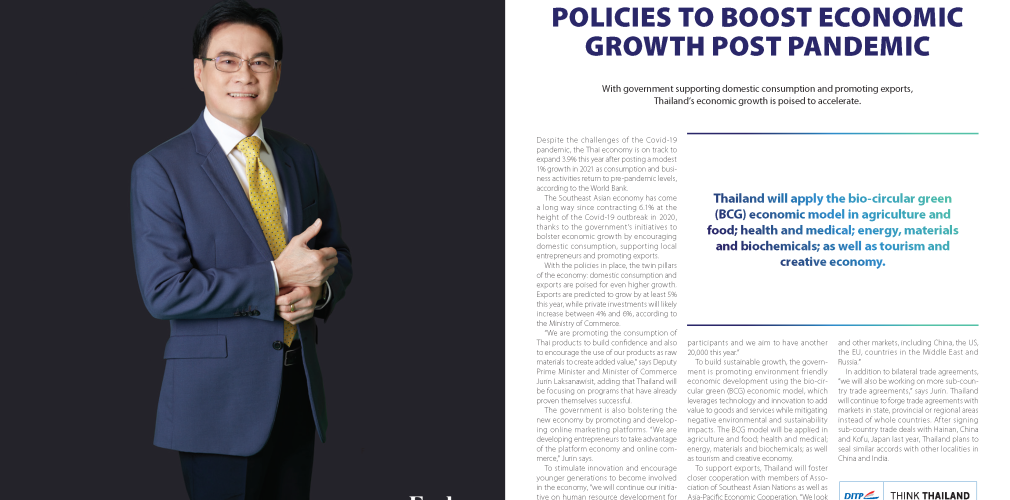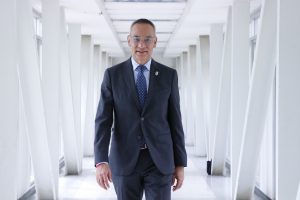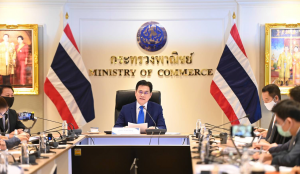Standfirst: With government supporting domestic consumption and promoting exports, Thailand’s economic growth is poised to accelerate.
Despite the challenges of the Covid-19 pandemic, the Thai economy in on track to to expand 3.9% this year after posting a modest 1% growth in 2021 as consumption and business activities return to pre-pandemic levels, according to the World Bank.
The Southeast Asia economy has come a long way since contracting 6.1% at the height of the Covid-19 outbreak in 2020, thanks to the government’s initiatives to bolster economic growth by encouraging domestic consumption, supporting local entrepreneurs and promoting exports.
With the policies in place, the twin pillars of the ecoonomy: domestic consumption and exports are poised for even higher growth. Exports are predicted to grow by at least 5% this year, while private investments will likely increase between 4% and 6%, according to the Ministry of Commerce.
“We are promoting the consumption of Thai products to build confidence and also to encourage the use of our products as raw materials to create added value,” says Deputy Prime Minister and Minister of Commerce Jurin Laksanawisit, adding that Thailand will be focusing on programs that have already proven themselves successful.
The government is also bolstering the new economy by promoting and developing online marketing platforms. “We are developing entrepreneurs to take advantage of the platform economy and online commerce,” Jurin says.
To stimulate innovation and encourage younger generations to become involved in the economy, “we will continue our initiative on human resource development for students to build more entrepreneurs,” says Jurin. “One of our programs, from Gen Z to CEO, focuses on helping the youth become entrepreneurs. In 2021 we had 20,000 participants and we aim to have another 20,000 this year.”
To build sustainable growth, the government is promoting environment friendly economic development using the bio-circular green (BCG) economic model, which leverages technology and innovation to add value to goods and services while mitigating negative environmental and sustainability impacts. The BCG model will be applied in agriculture and food; health and medical; energy, materials and biochemicals; as well as tourism and creative economy.
To support exports, Thailand will foster closer cooperation with members of Association of Southeast Asian Nations as well as Asia Pacific Economic Cooperation. “We look forward to closer cooperation with APEC member countries as Thailand will host APEC this year,” Jurin says. “We are also redoubling efforts to expedite trade between Thailand and other markets, including China, the US, the UE, countries in the Middle East and Russia.”
In addition to bilateral trade agreements, “we will also be working on more sub-country trade agreements,” says Jurin. Thailand will continue to forge trade agreements with markets in state, provincial or regional areas instead of whole countries. After signing sub-country trade deals with Hainan, China and Kofu, Japan last year, Thailand plans to seal similar accords with localities in India and China.
กระทรวงพาณิชย์ชูนโยบายกระตุ้นเศรษฐกิจหลังวิกฤตโควิด-19
กระทรวงพาณิชย์เปิดนโยบายกระตุ้นการเติบโตของเศรษฐกิจไทย โดยเน้นการส่งเสริมการส่งออกและการสนับสนุนการบริโภคสินค้าและใช้จ่ายภายในประเทศ เพื่อเร่งการเติบโตของเศรษฐกิจ หลังเกิดวิกฤตการระบาดครั้งใหญ่ของโรคโควิด-19
ธนาคารโลกคาดการณ์ว่า อัตราการเติบโตของเศรษฐกิจไทยจะขยายตัวถึง 3.9 % ในปีนี้ หลังจากปี 2564 ที่ผ่านมา มีอัตราการเติบโตเพียงเล็กน้อยที่ 1% ถึงแม้ว่าประเทศไทยจะประสบปัญหาและต้องพบกับความท้าทายครั้งใหญ่จากโรคระบาดโควิด-19 แต่ขณะนี้การบริโภคและการดำเนินธุรกิจต่างๆในประเทศไทย เริ่มฟื้นตัวกลับมาสู่ในระดับปกติ
ขณะเดียวกันปี 2563 การเติบโตของเศรษฐกิจเอเชียตะวันออกเฉียงใต้ มีการหดตัวถึง 6.1% ในช่วงที่มีการแพร่ระบาดของโควิด -19 ในวงกว้าง แต่รัฐบาลไทยยังคงเดินหน้าสนับสนุนการเติบโตทางเศรษฐกิจ ด้วยการกระตุ้นการบริโภคและการจับจ่ายภายในประเทศ สนับสนุนผู้ประกอบการในท้องถิ่น พร้อมกับการส่งเสริมการส่งออก ซึ่งถือได้ว่านโยบายข้างต้นเป็นกลยุทธ์ที่แข็งแกร่งในการขับเคลื่อนเศรษฐกิจ ทำให้การบริโภคภายในประเทศและการส่งออกมีอัตราการเติบโตที่เพิ่มสูงขึ้น โดยทางด้านของกระทรวงพาณิชย์ คาดการณ์ว่าการส่งออกในปีนี้ จะมีอัตราเพิ่มขึ้นอย่างน้อย 5% ขณะที่การลงทุนของภาคเอกชนมีแนวโน้มเพิ่มขึ้นระหว่าง 4% ถึง 6%
นายจุรินทร์ ลักษณวิศิษฏ์ รองนายกรัฐมนตรีและรัฐมนตรีว่าการกระทรวงพาณิชย์ กล่าวว่า โครงการต่างๆของประเทศไทยในตอนนี้ ว่าจะมุ่งเน้นไปที่โครงการที่ประสบความสำเร็จด้านการสร้างการเติบโตภายในประเทศ “เราจะเน้นการส่งเสริมการบริโภคสินค้าไทย เพื่อสร้างความมั่นใจและส่งเสริมการใช้ผลิตภัณฑ์ของไทย โดยเฉพาะอย่างยิ่งการนำวัตถุดิบมาสร้างให้เกิดมูลค่าเพิ่ม” นอกจากนี้รัฐบาลยังสนับสนุนโมเดลเศรษฐกิจใหม่ ด้วยการวางกลยุทธ์ส่งเสริมและพัฒนาแพลตฟอร์มการตลาดออนไลน์อีกด้วย “เรากำลังทำโครงการพัฒนาศักยภาพผู้ประกอบการไทย เพื่อให้ทุกคนได้ใช้ประโยชน์จากเศรษฐกิจแพลตฟอร์มและทำการค้าออนไลน์ได้เต็มประสิทธิภาพในยุคนี้”
กระทรวงพาณิชย์มุ่งเน้นการใช้นวัตกรรมและผลักดันให้คนรุ่นใหม่ได้เข้ามามีส่วนร่วมในการพัฒนาเศรษฐกิจมากขึ้น “เราจะสานต่อความคิดริเริ่มในการพัฒนาทรัพยากรมนุษย์สำหรับคนรุ่นใหม่เพื่อสร้างผู้ประกอบการมากขึ้น หนึ่งในโครงการของเรา มีผู้เข้าร่วมตั้งแต่คนรุ่นใหม่ในกลุ่ม Gen Z ถึงระดับ CEO โดยมุ่งเน้นไปช่วยให้เยาวชนได้พัฒนาความสามารถก้าวขึ้นสู่การเป็นผู้ประกอบการรายใหม่เพิ่มขึ้น โดยในปี 2564 เรามีผู้เข้าร่วมโครงการถึง 20,000 คน และในปีนี้เราตั้งเป้าว่าจะมีผู้สนใจอีกอย่างน้อย 20,000 คน” รัฐมนตรีว่าการกระทรวงพาณิชย์ กล่าว
ทั้งนี้เพื่อการเติบโตของเศรษฐกิจอย่างยั่งยืน รัฐบาลได้ทำการส่งเสริมการพัฒนาเศรษฐกิจผ่านโมเดลเศรษฐกิจ “BCG Model” หรือ Bio – Circular – Green Economy ที่เป็นมิตรต่อสิ่งแวดล้อมและช่วยสร้างความยั่งยืนได้อย่างแท้จริง โดยใช้ประโยชน์จากเทคโนโลยีและนวัตกรรมเพื่อเพิ่มมูลค่าให้กับสินค้าและบริการ โดย “BCG Model” จะมุ่งเน้นด้านสำคัญ ได้แก่ การเกษตรและอาหาร , สาธารณสุขและการแพทย์ , พลังงาน วัสดุและชีวเคมี , การท่องเที่ยวและเศรษฐกิจสร้างสรรค์
ประเทศไทยมีแผนที่จะร่วมมือกับสมาชิกของสมาคมประชาชาติแห่งเอเชียตะวันออกเฉียงใต้และความร่วมมือทางเศรษฐกิจเอเชียแปซิฟิกให้มากขึ้น เพื่อกระตุ้นการส่งออกให้เป็นไปตามเป้าที่ตั้งไว้ รัฐมนตรีว่าการกระทรวงพาณิชย์ กล่าวเพิ่มเติมว่า “เนื่องจากประเทศไทยได้เป็นเจ้าภาพเอเปกในปีนี้ เราจึงต้องพยายามมากขึ้นเป็นเท่าตัว ที่จะสร้างความร่วมมืออย่างใกล้ชิดกับประเทศในกลุ่มสมาชิกเอเปก ในการเร่งขยายการค้าระหว่างประเทศไทยและตลาดในประเทศอื่น เช่น จีน สหรัฐอเมริกา สหภาพยุโรป ประเทศในตะวันออกกลาง และรัสเซีย”
อย่างไรก็ตาม นอกจากข้อตกลงการค้าทวิภาคีแล้ว กระทรวงพาณิชย์จะดำเนินการเกี่ยวกับความตกลงทางการค้าฉบับเล็ก หรือ “Mini-FTA” เพิ่มเติมด้วย โดยในปีที่ผ่านมาประเทศไทยได้ทำข้อตกลงทางการค้าไปยังตลาดในพื้นที่แต่ละรัฐ จังหวัด หรือภูมิภาค ในต่างประเทศ ซึ่งประเทศไทยได้ลงนาม Mini-FTA กับมณทลไห่หนาน ประเทศจีน และจังหวัดโคฟุ ประเทศญี่ปุ่น เป็นที่เรียบร้อยแล้ว สำหรับในปีนี้ตั้งเป้าที่จะทำข้อตกลงกับส่วนท้องถิ่นในประเทศอินเดียและจีนเพิ่มเติม
![]()




